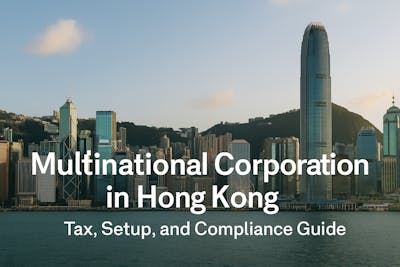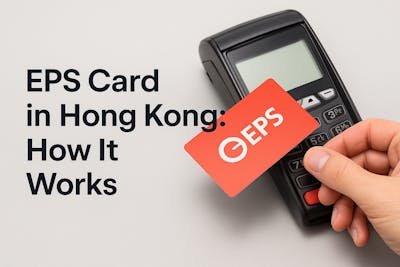Hong Kong is a major financial center with a strong economy, strategic location, and business-friendly rules. Its simple regulations and low, territorial taxes make it a common choice for entrepreneurs.
Business owners typically choose between a limited company (most commonly a private company limited by shares) or an unincorporated business, such as a sole proprietorship or partnership.
Sole proprietorships and partnerships are not companies under the Companies Ordinance and involve unlimited personal liability.
Limited Company: Hong Kong
A private company limited by shares is a separate legal person. Shareholders’ liability is limited to the amount unpaid on their shares.
Types of Limited Companies
Private Company (Limited by Shares)
Must restrict share transfers, cap members at 50 (excluding employee-members and former employee-members), and prohibit public invitations.
Public Company (Limited by Shares)
May offer shares or debentures to the public and is subject to higher compliance.
Company Limited by Guarantee
Used mainly for non-profit activities.
Key Characteristics
At least one natural-person director.
Public companies, companies limited by guarantee, and private companies in a group with a listed company cannot have corporate directors.
Other private companies may, but must still have at least one natural-person director (s.457).
A company secretary must be either:
- an individual who ordinarily resides in Hong Kong, or
- a body corporate with a registered office or place of business in Hong Kong.
A private company’s sole director cannot also act as secretary.
The Articles of Association govern the company. The Memorandum of Association has been abolished.
Shares may be transferred, subject to the restrictions outlined in the Articles regarding transfers of private companies.
Advantages
A limited company offers shareholders the benefit of limited liability, meaning their exposure is capped at the amount they invest.
Limited companies also make it easier to raise capital or bring in new investors through share issuances or transfers.
In addition, a limited company provides clearer governance and continuity than unincorporated businesses, which helps support long-term operations and growth.
Registration Process
Registering a private limited company in Hong Kong involves several steps:
- Choose a name and prepare the Articles of Association.
- File Form NNC1 with the Companies Registry and IRBR1 for business registration.
- Provide a registered office address in Hong Kong (no P.O. Box).
- Pay the prescribed fees and obtain the Certificate of Incorporation and Business Registration Certificate.
BRC fees (2025/26): HKD 2,200 for a 1-year certificate. A 3-year certificate usually comes to HKD 6,020 in total, but the exact amount depends on the start date and how much of the 3-year period falls after 31 March 2026.
Management Structure
Directors are responsible for managing the company’s affairs.
Shareholders may also serve as directors, provided the company has at least one natural person director as required under Hong Kong law.
The company secretary supports the board by maintaining statutory records, preparing required filings, and ensuring ongoing compliance with the Companies Ordinance.
Taxation
Hong Kong taxes companies under a two-tier system.
The first HKD 2 million of profits is taxed at 8.25%, and anything above that is taxed at 16.5%.
In addition, the system is territorial, but the FSIE rules mean some foreign-sourced passive income and certain disposal gains can still be taxed if they’re brought into Hong Kong and the company doesn’t meet the exemption requirements.
Every company must file a profits tax return whenever the IRD issues one, which for active companies is normally on an annual basis.
Unlimited Company: Hong Kong
In Hong Kong, people often use “unlimited company” to mean different things. In practice, ‘unlimited company’ is used loosely, so it helps to distinguish two structures:
Unincorporated businesses are not companies under Cap. 622.
An incorporated unlimited company under the Companies Ordinance is a company form where members have unlimited liability.
A) Unincorporated Businesses (Sole Proprietorship & Partnership)
Unincorporated businesses are small, low-risk, owner-managed activities that require minimal compliance and accept full personal exposure.
Key Characteristics
- Not incorporated under Cap. 622.
- The owner or partners have unlimited personal liability.
- Register with the IRD for a Business Registration Certificate within 1 month of starting.
- No Companies Registry filings or statutory audit.
- Licences/permits may be required depending on the activity.
Although there is no statutory audit requirement, the proprietor or partners must still keep proper business records to support their profits tax filings.
Management Structure
- Sole proprietorship: the proprietor runs the business.
- Partnership: partners manage under a partnership agreement (decision-making, profit share, exits).
Taxation
- Taxed as unincorporated businesses: 7.5% on the first HKD 2 million of assessable profits, then 15%.
- Territorial basis; annual profits tax filing with the IRD.
B) Unlimited Company (Incorporated under Cap. 622)
Unlimited companies are niche situations where owners intentionally accept unlimited liability (e.g., signaling credit strength) but still want corporate continuity and governance.
Key Characteristics
- A company formed under Cap. 622; members have unlimited liability.
- Separate legal person with full company law governance.
Management Structure
- At least one natural-person director.
- Company secretary must be a HK-resident individual or a HK body corporate with a local office.
- Maintain a registered office and statutory records; Articles of Association apply.
Filings and Audit
- Companies Registry incorporation and annual return filings.
- Annual audit required (unless dormant).
Taxation
- Taxed as a corporation: 8.25% on the first HKD 2 million of profits, then 16.5%.
- Territorial basis; note FSIE rules for certain foreign-sourced passive income and disposal gains received in Hong Kong unless conditions are met.
Choosing the Right Structure
Choosing the right structure is an important step because it affects liability, tax treatment, compliance obligations, and how easily your business can grow.
Factors to Consider
Liability Exposure
A limited company protects shareholders by capping their liability at the amount unpaid on their shares.
In contrast, sole proprietorships and general partnerships offer no liability protection—the owner or partners are personally responsible for all debts and claims.
An unlimited company (incorporated but with unlimited liability) offers no protection and should be used only when the owners fully accept personal exposure.
Business Size and Growth Plans
Sole proprietorships and partnerships work for small, low-risk, local operations that do not plan to raise outside capital.
A private limited company is the default for most SMEs in Hong Kong because it accommodates ownership changes, new investors, and long-term scaling.
Funding Needs
Unincorporated businesses generally rely on personal funds or loans.
A limited company can issue or transfer shares, making it easier to admit investors or raise capital.
Compliance Burden
Sole proprietorships and partnerships have the lightest ongoing burden: register the business with the IRD and file annual profits tax returns.
Limited companies must comply with the Companies Ordinance, keep statutory records, maintain a registered office, appoint a company secretary, and undergo an annual audit (unless dormant).
Privacy and Public Disclosure
Unincorporated businesses generally offer more privacy because they do not file corporate documents with the Companies Registry.
Incorporated entities must make more public filings and follow corporate governance rules, which increases transparency but reduces privacy.
Recommendation
Choose a sole proprietorship or partnership if you run a small, low-risk, owner-managed business and want minimal compliance cost while accepting full personal liability.
Choose a private limited company if you need liability protection, plan to raise capital, or expect to grow beyond a simple owner-managed setup.
Consider an incorporated unlimited company only in niche situations where owners deliberately accept unlimited liability while still wanting corporate governance and continuity.
At Air Corporate, our experienced professionals can guide you through the process and ensure you select the best structure for your business goals.
Contact us today for a free consultation!
FAQs
A limited company is a separate legal person. Shareholders have limited liability, capped at any unpaid amount on their shares.
“Unlimited” is used two ways:
1. Unincorporated businesses (sole proprietorships/partnerships): owners have unlimited personal liability.
2. Incorporated unlimited company (under Cap. 622): still a separate legal person, but members’ liability is unlimited.
Liability. A limited company shields shareholders (liability limited to unpaid share capital). An unincorporated business or an incorporated unlimited company does not provide that shield.
- Companies (limited and incorporated unlimited): two-tier corporate profits tax — 8.25% on the first HKD 2,000,000, then 16.5%; annual audit required unless dormant, plus Companies Registry filings.
- Unincorporated businesses (sole prop/partnership): two-tier unincorporated rates — 7.5% then 15%; no statutory audit and no Companies Registry filings (still register for a Business Registration Certificate and file profits tax).








